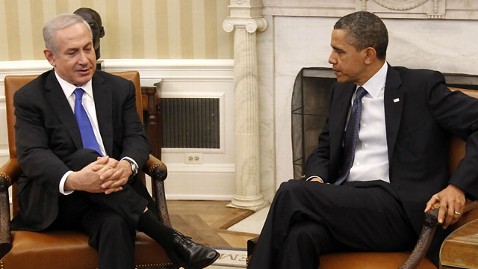More Americans Sympathize with Israel, Don't Want U.S. to Lead Peace Talks

AP Photo/Charles Dharapak, File
Many more Americans continue to side with Israel rather than the Palestinian Authority, but - with President Obama's first visit there days away - most also prefer to leave peace negotiations to the two protagonists, rather than having the United States take the lead.
Fifty-five percent in this ABC News/Washington Post poll sympathize more with Israel, vs. 9 percent who side more with the Palestinian Authority, with the rest favoring neither, or undecided. It's been a similar gap for many years, including polling back to the 1980s testing Israel vs. the Arab nations of the Middle East.
See PDF with full results, charts and tables here.
Despite that preference for Israel, seven in 10 want the U.S. largely to leave resolving the conflict to the Israelis and Palestinians themselves - a result that underscores the difficulties in finding a solution to the decades-old conflict. Preference for the United States to eschew a leading role is 15 percentage points higher than the last time it was asked in an ABC/Post poll, during an outbreak of violence between the two sides nearly 11 years ago.
Even among those who are more sympathetic to one side or the other, regardless of which side it is, about two-thirds don't want the U.S. to take the leading role. That preference rises to about three-quarters of those who don't favor either side.
In another expression of support for Israel, more Americans say the Obama administration has put too little pressure on the Palestinian Authority than too much pressure - 34 vs. 8 percent. They split about evenly, by contrast, on whether the administration has put too much or too little pressure on Israel. About four in 10, meanwhile, think the U.S. has appropriately pressured each side in the conflict.
RELIGION and POLITICS - This poll, produced for ABC by Langer Research Associates, finds little sympathy for the Palestinian Authority across groups, always well behind support for Israel. However, breadth of support for Israel varies considerably, with the Palestinian Authority and frustration with both groups gaining somewhat among less broadly pro-Israel groups.
Among religious groups, sympathy for Israel peaks, at 76 percent, among evangelical white Protestants, falling to 55 percent among non-evangelical white Protestants and Catholics, and bottoming out at 39 percent among those who aren't religiously affiliated. Religiosity is a factor as well, with those who attend religious services more apt to side with Israel.
Support for Israel also is broad - more than seven in 10 - among Republicans and conservatives alike. This drops to roughly five in 10 moderates, independents and Democrats, and to just 39 percent of liberals, with more saying they favor neither side, compared with Republicans and conservatives.
A similar pattern plays out on the matter of the Obama administration's use of influence on each side, with Republicans and conservatives more likely than others to think Israel is being pressured too much and the Palestinian Authority too little. Majorities of Democrats, not surprisingly, are happy with the pressure the Obama administration's applying to each side.
On the other hand, when it comes to U.S. involvement in the peace process, there's agreement across religious, partisan and ideological groups (from 66 to 70 percent) that the two sides should handle negotiations themselves.
Age is another prominent marker of support for Israel, ranging from 48 percent among younger adults to 57 percent of 40- to 64-year-olds and topping out at two-thirds among seniors. Views that the Obama administration is putting too much pressure on Israel, and is applying too little of its muscle with the Palestinian Authority, also peak among seniors.
Obama is scheduled to leave Wednesday for a two-day visit to Israel and the West Bank, ruled by the Palestinian Authority.
METHODOLOGY - This ABC News/Washington Post poll was conducted by telephone March 7-10, 2013, among a random national sample of 1,001 adults, including landline and cell-phone-only respondents. Results have a margin of sampling error of 3.5 points, including design effect. Partisan divisions are 33-25-35 percent, Democrats-Republicans-independents.
The survey was produced for ABC News by Langer Research Associates of New York, N.Y., with sampling, data collection and tabulation by Abt-SRBI of New York, N.Y.